Exclusive: Original Heart Axeman Roger Fisher (Part 1)
Talks Heart, Tone, EVH, KISS and more!
Do you remember Roger Fisher? If you’re a classic rock fan, you should. But in case you don’t, just know that he was the co-founder of the band Heart and wrote many of that band’s signature riffs and tunes – “Barracuda” being one outstanding example.
That’s right. Heart was not founded by the talented Wilson sisters, and they did not write all the songs. And when Roger left the band because his relationship with Nancy Wilson fell apart (as did his brother’s with Ann – ouch!), we got the ’80s Heart – which was successful, but the tunes…not nearly as good.
With help from user Bobby D at thegearpage.net forums, I managed to track Roger down for an interview. My impression of him from that conversation is that he’s very cool, spiritually enlightened and mellow, and was okay with talking about things that happened 30 years ago. He even remembered what gear he used!
Anyhow, without further preamble, here’s the first part of the interview with many thanks to Roger.
WoodyTone: During your tenure in Heart, the band had a consistent and unique sound. Did you have a vision for that or did it just sort of happen organically?
Roger: It just happened organically – just a natural evolution of influences and desires our in music. And we’ve always been…I’ve always loved the woods, and one thing about the woods is that everything is natural. When I was trying to move on stage and figure out how I should be as a musical character, when I finally found what felt natural and natural to play – what defined my musical direction and my direction on stage – it was pretty related to what’s in nature. [Natural] things don’t try to be something they aren’t. They just are what they are, and it all just unfolds without a whole lot of thought or effort.
Part of the reason I say that is a lot of [musicians] out there are trying to be like so and so, and they have all these influences, but sometimes those influences are so strong it’s kind of a shame. So you’re not seeing just the one guy, but [that] one guy and his influences – whereas he could be a lot more original than that.
My favorite compliment is that I sound like Roger Fisher.
How much did your brother influence this sound?
He originally was [Heart’s] manager, and in that managerial role he was a huge influence on the band. After shows, and we were playing 5-6 nights a week, 4-5 hours a night – we were playing a lot when living up in Canada [where what would become known as Heart was first formed]. I think after every show he would have something to say to one or more of us. It was a constant growing process and he was relentless, very intent on seeing us improve all the time.
If it hadn’t been for Mike, we never would’ve reached the level of success we were able to reach because he fine-tuned that band. Not just the players and performing, but the way the equipment was set up and was torn down so that when the band went and did a show, it was just a tightly run operation from beginning to end. That was mostly because of my brother.
[Roger has the following artists listed on his website as influences: the Stones; The Kinks; Gerry and the Pacemakers; Lovin’ Spoonful; the Beach boys; the Ventures; Scotty Moore; Jim McCarty; Howard Roberts; Nokie Edwards; John Lennon; George Harrison; Paul McCartney (Roger notes, “Paul played several of The Beatles’ solos, including Taxman”); Eric Clapton; Jimmy Page; Jeff Beck; Jimi Hendrix. And: “Louie Armstrong, Victor Borge, and Buddy Guy are some of my favorite live performers.” Asked if he could winnow that list down to his biggest guitar influences, he said the following.]
I left others out of that list, but another real key one was Ritchie Blackmore. I took all his solos and put them back to back on a tape, and I would just listen to them over and over and over, and I learned a lot of them. His technique was really good. He’s got these really slender fingers that are very precise. He was a big influence.
I really focused on Jimmy Page for quite a while. It’s amazing being an artist because when you get really deeply into one of your greatest influences’ craft, you start to get a feel for their spirit, the essence of who they are. For instance, when I was in a Rolling Stones tribute group, I got into Keith Richards so strongly I really felt like I could feel what it was like to be him in a musical way. And when you see a performing artist who does impressions or a cover band who play many other groups really well, they touch on that essence and capture that essence. There’s a guy from Seattle by the name of Randy Hansen who’s just an uncanny Hendrix tribute person. He captures Hendrix’s essence so well, I think he plays things that Hendrix would be playing now, that no nobody’s every heard before. He’s like a living embodiment of Hendrix.
You had a distinct style back then. Do you remember thinking that you had your own thing going or were you trying to be unique?
I wasn’t even thinking about my own style. I didn’t even know what I was doing. I just knew I wanted to be different. I thought it was kind of like stealing to be copying people blatantly.
I could copy other people really well. I used to do the Dazed and Confused solo in nightclubs note for note, and thought I could do it very well. When I started writing originals, I said, ‘I can’t sound like all these other guys.’ I’d come up with something and if it sounded familiar I wouldn’t do it. Try to keep hearing melodies in your mind until you come up with something you haven’t heard before, and work on that. That line of direction will lead one to their own personal stamp.
Another thing I did was looked at the origin of rock. I knew that it came from the blues, and that the blues came from Africa, and that the blues was born in an incredibly painful state: You’ve got a kid, a young man, whose family in Africa may have been shot in front of him, he’s thrown on a slave ship in extremely unsatisfactory conditions, brought to America, sold and then has to work on a plantation or at some job, and from that pain came the music that went on to because the most universal music in the world, the blues.
So what I tried to do with my guitar-playing was always remember those roots. And when I played guitar I would feel pain, and infuse the playing with joy and energy. And being a very high-energy person I think the listener can feel my solos well because there’s so much emotion in them. When I’m recording those solos, my body from head to toe is just in a state of thrill.
So this is playing as transcendental or spiritual experience, not wrestling with the instrument. That’s the beauty of music. It’s capable of taking one’s essence and communicating that.
It’s like a quartz crystal: If you hook wires up to it, whatever vibration stimulates that quartz crystal generates electricity. It’s the same thing with a human body. Put a guitar on someone in touch with their spirit, and you will hear that spirit vibrating.
Heart, ‘Sing Child Sing,’ Live, 1976
> Roger does some extended soloing on this tune, gets way into the Page/Zep thing (including the violin bow!).
> This is his Les Paul through the Hiwatts (discussed in part 2 of the interview), presumably turned down for TV.
– End of part 1 (of 3) –
Category: Roger Fisher






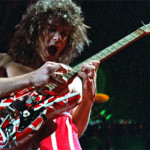

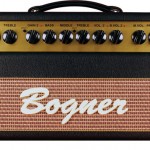


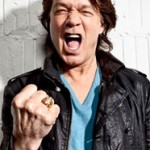
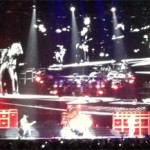
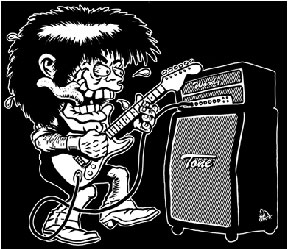

this is great! i love this interbiew, can't wait for parts 2 and 3…well done!